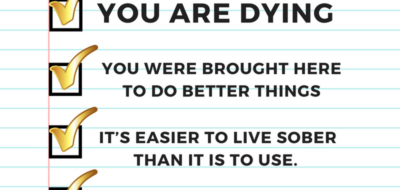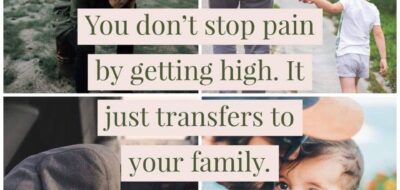IF YOU STRUGGLE with addiction as I have, you know the dark, hopeless place that exists on the other side of being high. It’s the thing that every addict tries to avoid—reality. Reality is the time and place when you’re not high or intoxicated and forced to face the consequences of your actions. For me, reality was the morning after. I’d lie in bed and remember all the horrible, embarrassing things I’d done the night before. I would replay each moment wishing I could turn back the hands of time and undo my humiliating deeds. To cope with my painful emotions, I sought relief through substance abuse and then the process would start all over again. I was baffled by my inability to use drugs and alcohol socially. I tried changing how much I used, what I used, and the places I used, but it didn’t help. Each time I consumed a substance, the consequences seemed to get worse. In spite of my good intentions, I continued hurting my family and my life was a mess.
At the time, I didn’t believe I was addicted. I didn’t know I was sick or that my thinking had changed. Addiction is sneaky. It starts with subtle shifts in your perception and behavior. The following are five ways it can play tricks on you.
(1) You’re in Denial
Denial is a primary roadblock to getting help. Denial makes things appear smaller than they are. Denial tells you your problems aren’t that bad. Denial says I’m not hurting anyone. Denial says I can quit whenever I want to. Denial protects you from facing the facts. Denial is dangerous as it minimizes warning signs and perpetuates the problem. No amount of pretending can make addiction go away.
(2) You Make Promises You Can’t Keep
You promise to show up on grandma’s birthday. Yes, you’ll pick up the kids after school. Of course, you’re coming home straight after work. But in spite of your good intentions, you’re unable to follow through. You can’t predict what might happen anymore. You’ve lost credibility. The more you try and control your addiction, the more it controls you. Every time you use the substance, you break hearts and hurt the people you love.
(3) You Manipulate Your Friends and Family
You lie to cover up what you’re doing. You tell people what they want to hear to get them off your back. You may pit parent against parent, or friend against friend. You know who to call when you need money. You’re good at fabricating excuses and making it seem like the problems in your life are never your fault. You blame others when cornered and manipulate your loved ones through guilt and fear tactics.
(4) You don’t tell anyone, but you’re scared, and you cope with your fear by using more
While using the substance was fun in the beginning, now it’s become work. Maintaining your addiction is a full-time job. When you’re not high, you feel fearful and anxious. The euphoric release you once found in the substance has disappeared. You’ve developed tolerance and need increasingly larger doses to produce the same physiological and psychological effects. You’re not using to feel high anymore; you’re using to feel okay and avoid withdrawal symptoms.
(5) You feel ashamed
You know your life is out of control, but you don’t know how to make it stop. You hurt everyone who loves you. Your best thinking is killing you. You can’t look in the mirror. You feel ashamed and avoid people. Shame is an uncomfortable, toxic emotion. Shame tells you you’re unworthy, unlovable, and inadequate. Shame says give up. Shame creates feelings of hopelessness and despair.
Take responsibility
While you’re not responsible for your addiction, you are responsible for your recovery.
Nobody wakes up and says “I’m going to be an addict.” But there is one choice addicted people make, and that’s how long they will stay sick. While addiction isn’t a choice, recovery is.
When the most destructive force in your life is you, then it’s time to reach out for help.
Good intentions followed by broken promises don’t mean you’re a terrible person. Substance use disorder is a progressive disease that if left unchecked can be terminal. But there is hope. Addiction is treatable. Recovery happens when you stop making excuses and start taking action. The key to wellness is breaking your silence and admitting you need help. There’s no shame in wanting to get better and the only way you can fail at recovery is to quit trying.
We Can Help You
If you or someone you know needs help with addiction, or if you have any other questions, please call us. Our phone lines are open 24 hours a day, 7 days a week—so you can call us anytime at one of the following numbers:
- 1-866-925-8306 for Bellwood treatment center in Toronto, ON
- 1-866-946-4806 for Edgewood treatment center in Nanaimo, BC
- 1-888-488-2611 for Clinique Nouveau Depart in Montreal, QC
- (866) 627-8604 for Whiterock treatment center in Surrey, BC







Pamila Washburn
Lorilee, I looked on Amazon with the intention of buying your Jagged series. The Jagged Little Lies book has a price range starting at $98.88 and goes up to $555.72. I kid you not. And that was for the paperback!
Lorelie
Hi Pamila, I saw that too. That’s not me selling the books but previous book owners who are selling their edition one books and getting that price. You can find my Jagged series (edition 2) on Amazon for a reasonable price by clicking on this link. The books come in kindle edition or paperback. Best wishes!
https://www.amazon.com/Jagged-Little-Lies-book-two-ebook/dp/B07KQCFQWH/ref=pd_sim_351_1?_encoding=UTF8&pd_rd_i=B07KQCFQWH&pd_rd_r=9f51de63-0abd-11e9-909f-2fe01a604df2&pd_rd_w=x5RO9&pd_rd_wg=nCSE6&pf_rd_p=18bb0b78-4200-49b9-ac91-f141d61a1780&pf_rd_r=DEP6T33EYZK7P0AMDR9X&psc=1&refRID=DEP6T33EYZK7P0AMDR9X
Jodi brummitt
Im 60 been on this recovery road way t too long now my daughter outta out there shooting heroin abandoned het kids us herself.
Lorelie
Jodi, I’m sorry for your pain. Addiction is an ugly illness that can take down entire families. You can help yourself stay healthy by seeking support through family groups such as Naranon, Alanon, Family Anonymous, counseling etc. Hugs to you.